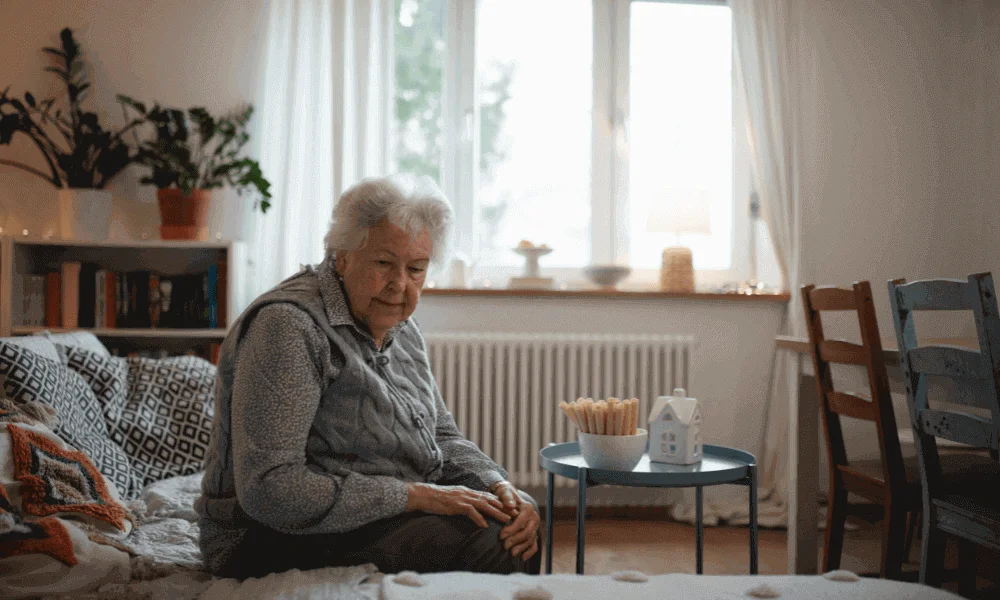In this article, we’ll explore what lonely seniors do so you can recognize the signs of loneliness. You’ll also discover 7 activities that help keep the fun and inner child alive—keeping boredom out of the picture.
What do Lonely Seniors Do?
Loneliness in older adults shows up through subtle signs. They may withdraw from people, lose interest in conversations, or stop enjoying activities they once loved. That’s why it’s important to be observant and keep check if you notice these changes.
1. Unusual Social Withdrawal:
This means the senior starts avoiding people or situations they once enjoyed. They might stop attending family gatherings, and community events, or even avoid phone calls or visits. Unlike introversion, which is a personality trait, this withdrawal is sudden and uncharacteristic. It’s often triggered by emotional pain, grief, or a sense of disconnection. If left unaddressed, it can lead to deep loneliness or even depression.
2. Lack of Appetite:
Loneliness can have a strong impact on physical health, including eating habits. Some seniors may start skipping meals or eating very little, not because of illness, but because they don’t feel motivated to eat alone. Food may no longer feel as enjoyable. This can lead to unintended weight loss, weakness, and nutrient deficiencies.
3. Sleep Disturbances:
An Article published in NHS 2021 was the first-ever study to examine the link between loneliness and sleep disturbances in older adults. The study found that both loneliness and sleep problems are serious concerns, as they are associated with a higher risk of illness and death (morbidity and mortality). That’s why it’s important to assess these issues properly—even if an older person doesn’t live alone.
The research also highlighted the need to pay attention to excessive sleep, not just poor or insufficient sleep. Sleeping too much can lower energy levels during the day and make it harder for seniors to stay socially engaged.
4. Feeling Overwhelmed with Basic Tasks:
Simple daily activities like cooking, cleaning, or doing laundry can suddenly become a burden and they may start procrastinating. This isn’t always due to physical limitations. A lonely senior might feel like “there’s no point” in doing things just for themselves. This emotional exhaustion or lack of motivation can be a subtle yet serious sign that they’re struggling with isolation or sadness.
Other Signs of Loneliness in Older Adults:
- Daytime Drowsiness
- Frequent Complaints of Aches, Pains, and Headaches
- High Dissatisfaction with Medical Care
- Increased Buying Habits
- Imaginary Health Issues
- Unusual Reliance on Warmth (taking hot baths)
- Spending More Time on Mobile Phones

How Do You Keep an Elderly Person Busy?
There are many ways to help seniors cope with isolation. In this guide, we’ll explore specific activities that can keep an elderly person busy, active, and engaged. These include a mix of indoor and outdoor options, all meant to prevent boredom.
1. Gardening:
While gardening is a refreshing hobby, it also brings real physical and mental health benefits. Studies show that spending time outdoors and tending to plants can boost emotional well-being and overall fitness in seniors. That’s because gardening involves gentle movement that keeps the body active, and sunlight exposure helps lift the mood.
Seniors can easily start gardening at home or join a local gardening club to enjoy the added fun of social connection!
Here are some resources if you wish to join the gardening communities or cubs in Ontario.
- Garden Ontario
- Gardening – SRCHC
- Savana Seniors
- Spring Gardening for Seniors
- Community Gardens – Mississauga
Tips for Safe and Enjoyable Gardening:
- Pick light, ergonomic tools.
- Keep a water bottle nearby and take regular breaks.
- Wear gloves to protect your hands and prevent skin irritation.
- Use raised beds or large containers to avoid bending too much.
- Stick to simple plants like mint, basil, or marigolds if you’re just starting out.
- Garden during early morning or evening to avoid strong sunlight in extreme weathers.
2. Fishing:
Just like gardening, going on a fishing trip can be incredibly refreshing for seniors. Activities connected to nature and the outdoors not only lift the mood but also support physical and emotional well-being. In Ontario, seniors can enjoy fishing for free four times a year with their families, where no license is required. It’s a great way to bond and relax together.
3. Make Home Improvements:
This one helps with the boredom many elderly people often experience. A change of environment can sometimes do wonders. If your elderly loved one has mentioned a specific part of the house they’d like to update—maybe their room or an old piece of furniture, help them in what they want to achieve by offering tools, material, and moral support. You can also help them figure out what they want to renovate and support them in bringing that vision to life.
Also, try to involve them in small household work. That alone can be enough to fill up their mind and their days.
Here’s a look at stories of retirees who filled up their days with just normal tasks and found themselves even busier than work.

4. Playing Online Games:
Research conducted by North Carolina State University shows that seniors who play online games regularly report better emotional well-being compared to those who don’t. More and more studies are highlighting the growing number of older adults engaging in online gaming.
Games like Bejeweled are especially popular among seniors. If your loved one isn’t tech-savvy, start small and encourage them to try different games to see what they enjoy.
5. Arts & Crafts:
Painting, knitting, or even simple coloring can be a soothing and enjoyable way for seniors to spend time. Arts and crafts stimulate creativity, support memory, and improve hand-eye coordination. Moreover, they give a sense of accomplishment when a project is finished.
6. LEGO & Model Building:
Yes, even older adults enjoy building things! It’s a great way to maintain their fine motor skills, spatial reasoning, and focus. These hands-on activities keep the hands busy and the mind sharp. Plus, it’s incredibly satisfying to see something come together piece by piece. Whether it’s a model car, a puzzle, or a LEGO set, the sense of achievement is always rewarding.
7. Live Music:
Live music isn’t just entertainment—it’s an uplifting experience that can brighten a senior’s entire week. Listening to music in a shared space brings emotional connection, nostalgia, and even light physical movement like toe-tapping or clapping along.
Here are some great places where older adults in Ontario can enjoy live music sessions:
- Canadian Opera Company (COC): Free Concert Series
- Casa Loma: This historic castle hosts special events like afternoon tea, garden jazz sessions, and symphony performances.
- Eventbrite: Eventbrite has a section for seniors’ events and activities in Toronto, which may include concerts.
Have the Fun of Daily Living with Our Compassionate Home Care Services:
Loneliness doesn’t have to be a long-term reality for your aging parent or loved one. At ConsidraCare, we believe that daily life should still feel joyful—even with age, illness, or disability.
Our team includes registered nurses and personal support workers who assist seniors requiring minimal medical attention to those managing chronic conditions. Our main goal is to improve their quality of life so they can age in place, recover, or get better on their own terms. With our support, seniors stay active, involved, and emotionally supported.
We also create personalized care plans in coordination with family members, ensuring that every aspect of the care aligns with the senior’s needs, preferences, and values.
Call us today to explore your in-home care options across GTA.

Final Thoughts:
Aging doesn’t mean giving up on joy or the fun activities elders used to enjoy. Many older adults often feel disconnected or simply not motivated enough to do anything—even the things they once loved. That’s why they need a little structure and gentle encouragement to ease into a smoother routine.
Start by encouraging them to fill their day with simple household tasks. If they get bored with that, slowly introduce fun activities—like games, events, or even enjoying concerts. The key is to keep things light, engaging, and tailored to what they enjoy.
FAQ’s
1. What hobby should a 70-year-old have?
Creative hobbies like painting, knitting, and puzzles help keep the mind sharp. Photography and birdwatching are great for someone who enjoys nature. Some also enjoy learning an instrument like the guitar. These activities bring joy, purpose, and keep the mind stimulated.
2. What are good activities for older adults with dementia?
Simple activities like looking at photos, listening to music, or coloring can calm and comfort. Light movement, like yoga and Pilates, is also helpful. Tasks like folding towels or sorting objects are also beneficial if you want to keep them engaged and want their participation in everyday life.
3. What are self-care activities for older adults?
Self-care is a deeply personal experience and an important part of maintaining a good quality of life as we age. Activities like volunteering or connecting with friends and family can bring a sense of purpose and make life feel more meaningful. You can also enjoy audiobooks that match your taste and preferences—it’s a relaxing way to stay mentally engaged and entertained.
4. What are good activities for older adults with disabilities?
Older adults with disabilities can still enjoy many fulfilling activities. Letting them raise a plant and take care of it gives a sense of responsibility, and seeing it bloom can be deeply satisfying. Sing-along activities are also enjoyable, especially for those with limited mobility or vision. Light exercises like chair yoga can help improve flexibility and mood without putting strain on the body.
5. Why are activities important for the elderly?
Activities are important because they help keep older adults healthy—both mentally and physically. Social isolation and loneliness are quite common in old age, and limited physical activity after retirement can increase the risk of depression and cognitive decline. Encouraging seniors to take part in activities that match their interests can lead to better health outcomes, improved sleep quality, and a lower risk of heart disease more specifically.





